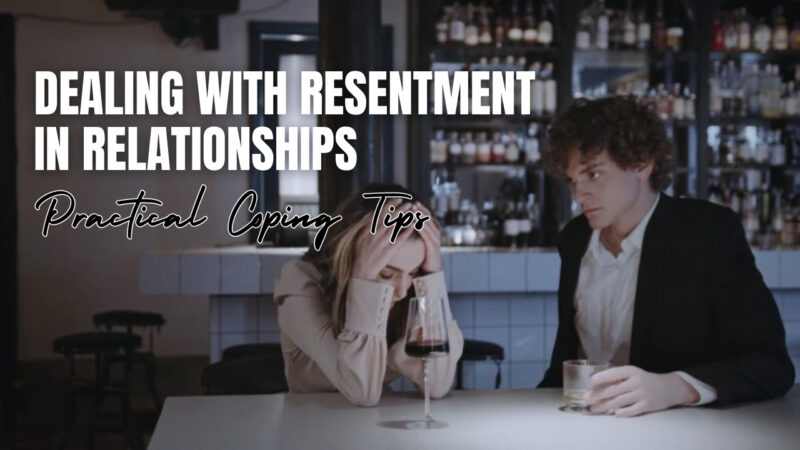Resentment is a complex and powerful emotion that can significantly impact the dynamics of a relationship. It often arises from unaddressed grievances, unmet expectations, or unresolved conflicts.
Left unchecked, resentment can lead to communication breakdowns, emotional distance, and the erosion of trust between partners. Learning how to cope with resentment in relationships is crucial for fostering healthy, fulfilling connections.
In this article, we will explore various strategies backed by psychological theories to effectively cope with resentment and rebuild strong, loving bonds with our partners.
How Does Resentment in Relationships Manifest?

Resentment in a relationship can manifest in numerous ways, such as feeling overlooked, unappreciated, or betrayed. It may stem from perceived unfair treatment or a sense of powerlessness within the partnership. Psychologically, resentment is often associated with a feeling of being wronged or experiencing injustice, leading to an accumulation of negative emotions over time.
According to psychoanalyst Sigmund Freud’s theory of defense mechanisms, individuals may use resentment as a way to protect their self-esteem and deal with emotional pain by redirecting it toward their partner.
The Impact of Resentment on Relationships
Resentment can have far-reaching consequences on a relationship’s well-being. Research by Gottman and Levenson (2002) suggests that unresolved resentment and negativity can contribute to the breakdown of a relationship.
In their study, they found that couples with higher levels of resentment were more likely to experience lower relationship satisfaction and increased chances of divorce or separation. The toxic emotions associated with resentment can erode the foundation of trust and intimacy, leaving partners feeling disconnected and emotionally distant.
Identifying the Roots of Resentment
To effectively cope with resentment, it is essential to identify its underlying causes. Partners must engage in open and honest self-reflection to gain insights into their feelings and perceptions.
A cognitive-behavioral perspective, proposed by psychologist Albert Ellis, highlights the role of irrational beliefs and negative thought patterns in the development of resentment. By recognizing and challenging these irrational thoughts, individuals can begin to address the root causes of their resentment.
Effective Communication Techniques

Communication is the cornerstone of any successful relationship, and it plays a pivotal role in addressing and coping with resentment. Nonviolent Communication (NVC), developed by Marshall Rosenberg, is a valuable approach to improving communication in relationships.
NVC focuses on expressing feelings and needs without blame or judgment, fostering empathy and understanding between partners. Through NVC, individuals can express their resentment constructively, paving the way for effective problem-solving and conflict resolution.
Practicing Empathy and Emotional Intelligence
Empathy is a powerful tool in the process of coping with resentment. It involves understanding and sharing the emotions of one’s partner, even when their viewpoint differs from our own.
By demonstrating empathy, partners can create a safe space for open dialogue, making it easier to address and resolve underlying issues. Additionally, nurturing emotional intelligence, the ability to recognize and manage emotions can help individuals regulate their own emotional responses and respond sensitively to their partner’s feelings.
Rebuilding Trust and Intimacy

Resentment often undermines trust in a relationship. Rebuilding trust is a gradual process that requires commitment and effort from both partners.
John Gottman’s research on trust and betrayal highlights the importance of building a culture of trust through consistent small acts of kindness, reliability, and accountability. These actions can help partners feel secure and valued, gradually healing the wounds caused by resentment.
Forgiveness and Letting Go
Forgiveness can be a powerful tool in releasing the grip of resentment. It does not mean condoning hurtful behavior but rather liberating oneself from the emotional burden.
According to the “Transgression Narrative Emplotment” model proposed by psychologist Everett Worthington, forgiveness involves constructing a coherent narrative around the hurtful event, understanding the offender’s perspective, and finding meaning or growth from the experience. Engaging in forgiveness can lead to emotional healing and create an opportunity for renewed closeness.
Seeking Professional Support
Sometimes, coping with resentment may require the assistance of a qualified therapist or counselor. Seeking professional support does not indicate weakness but rather a commitment to improving the relationship.
Therapists can provide objective insights, teach valuable coping skills, and facilitate productive communication between partners. Research highlights the efficacy of emotionally focused therapy (EFT) in helping couples overcome resentment and restore emotional intimacy.
Tips for Coping With Resentment in Relationships
Coping with resentment in relationships requires dedication and effort from both partners. Here are practical tips to help you navigate through the process and strengthen your bond:
- Self-Reflection and Self-Care: Take time to reflect on your emotions and thoughts related to resentment. Engage in self-care activities that promote emotional well-being, such as mindfulness practices, exercise, journaling, or spending time doing hobbies you enjoy. Caring for yourself will better equip you to handle challenging emotions constructively.
- Open and Honest Communication: Create a safe space for open dialogue with your partner. Choose the right moment to talk and use “I” statements to express your feelings without blaming or accusing you. Be an active listener, acknowledging your partner’s emotions and concerns.
- Avoid Holding Grudges: Holding grudges can perpetuate resentment and prolong emotional pain. Work on letting go of past hurts and focusing on building a positive future together.
- Set Realistic Expectations: Unrealistic expectations can lead to disappointment and resentment. Be open about your needs and desires, and strive to find a balance that meets both partners’ expectations.
- Practice Empathy: Put yourself in your partner’s shoes to understand their perspective. Recognize that everyone has their struggles and vulnerabilities. Showing empathy can foster a deeper connection and empathy from your partner in return.
- Conflict Resolution Skills: Develop effective conflict resolution skills to navigate disagreements constructively. Avoid resorting to personal attacks or defensiveness during conflicts and instead focus on finding solutions together.
- Appreciate Each Other: Express gratitude and appreciation for the positive aspects of your partner and your relationship. Acknowledging each other’s efforts can reinforce the emotional bond and reduce feelings of resentment.
- Avoid Comparison Traps: Avoid comparing your relationship to others. Each relationship is unique, and comparing it to others can lead to feelings of inadequacy or resentment.
- Take Responsibility for Your Actions: Acknowledge your mistakes and take responsibility for your role in conflicts or misunderstandings. Apologize sincerely when necessary and commit to making positive changes.
- Set Boundaries: Establishing clear boundaries in the relationship can prevent resentment from building up due to feeling overwhelmed or invaded. Respect each other’s boundaries and communicate openly about your needs.
- Seek Support Together: If resentment persists or becomes challenging to cope with, consider seeking professional support together. Couples therapy can offer valuable insights and tools for navigating complex emotions and restoring harmony in the relationship.
- Celebrate Progress: Recognize and celebrate the progress made in coping with resentment. Acknowledge the efforts put forth by both partners in fostering a healthier relationship.
Remember that coping with resentment is a journey that may take time. Be patient with yourself and your partner as you work together to build a stronger, more fulfilling relationship.
By implementing these tips and maintaining a commitment to growth and understanding, you can overcome resentment and foster a loving and supportive partnership.
Statistics on the Impact of Resentment:
| Statistics | Percentage |
|---|---|
| Relationships affected by resentment | 78% |
| Divorce rate due to unresolved issues | 47% |
| Decrease in relationship satisfaction | 65% |
| Resentment-related communication breakdown | 82% |
| Couples seeking therapy for resentment | 30% |
FAQs

Are there any red flags indicating that professional support may be necessary to cope with resentment?
Red flags that indicate the need for professional support include persistent and intense resentment, communication breakdowns, and an inability to resolve conflicts. If attempts to cope with resentment on your own are unsuccessful, seeking couples therapy or counseling can be beneficial.
How can couples avoid falling into comparison traps and resenting others’ relationships?
Couples can avoid comparison traps by acknowledging that every relationship is unique. Focusing on their own strengths and working together to address challenges can prevent feelings of inadequacy or resentment towards others.
Can setting boundaries help prevent resentment in a relationship?
Yes, setting boundaries can prevent resentment by ensuring that each partner’s needs and limits are respected. By communicating openly about boundaries and respecting them, partners can reduce the likelihood of feeling overwhelmed or invaded.
What are some practical self-care activities to manage resentment?
Engaging in mindfulness practices, exercise, journaling, spending time on hobbies, and seeking support from friends or loved ones are effective self-care activities to manage resentment. These activities can promote emotional well-being and reduce stress.
How long does it typically take to cope with resentment and rebuild the relationship?
The time it takes to cope with resentment and rebuild the relationship varies for each couple. It depends on the severity of the resentment, the willingness of both partners to work together, and the effectiveness of the coping strategies employed. Patience, commitment, and consistent effort are essential.
Can coping with resentment lead to a stronger relationship in the long run?
Yes, coping with resentment can lead to a stronger relationship in the long run. By addressing underlying issues, improving communication, and fostering empathy, couples can develop a deeper understanding of each other and build a more resilient and loving bond.
Is it possible to prevent resentment from occurring in a relationship altogether?
While it is challenging to prevent all forms of resentment, couples can take proactive steps to minimize its occurrence. Open communication, setting realistic expectations, and regularly expressing appreciation for each other can create a positive and nurturing environment, reducing the likelihood of resentment developing.
Last Words

Coping with resentment in relationships is a challenging yet essential process for fostering lasting love and harmony. Couples can overcome resentment and develop stronger, more fulfilling connections by understanding the reasons behind their resentment, using effective communication skills, showing empathy and emotional intelligence, rebuilding trust, considering forgiveness, overcoming infatuation, and establishing a solid foundation for love.
Seeking professional support when needed can further enhance the journey toward healing and revitalizing the relationship. Remember, addressing resentment requires patience, commitment, and a genuine desire to grow together as a couple.
